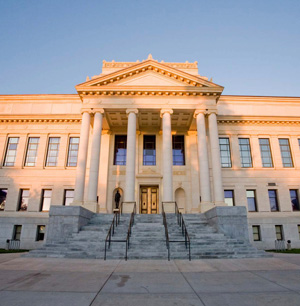Reese & Shadley: The University of Utah is Not a Democracy, but It Can Be

The Park Building at the top of President’s Circle, where the U administration works. (Chronicle archives)
April 30, 2021
In 2021, undemocratic systems of government are almost universally viewed as indefensible. Democratic elections are popular across the world, with 78% of people from 38 countries supporting some form of political democracy. Yet even in democratic governments, citizens willfully submit to an undemocratic structure that dictates where they live, what they eat and what they do: the workplace.
The average American worker spends 43.9 hours a week at work, during which they forego ownership of their time to secure a wage—meaning most Americans will spend more time with their bosses than their families. Without the freedom to prioritize family needs, we miss countless soccer games, award ceremonies, family gatherings and other moments due to workplace responsibilities. The elusive American ideal of democracy should not be confined to Capitol Hill, but should extend to every facet of American life, especially something as prominent as work.
Workplace democracy, a system where all employees have equal representation in organizational decisions, would bring the autonomy, opportunity and rights of democracy to the work-lives of 125 million full-time workers in the United States. Nearly every industry would benefit from workplace democracy, but universities in particular possess a rich history of pursuing these ideals for their workers. However, with the rapid corporatization of universities, they’ve veered from those values. It’s time academia gets back on track.
Workplace Democracy
Workplace democracy is the application of democratic practices like debate, voting and participatory decision-making systems to the workplace. In comparison to unionization, which allows workers to participate in collective bargaining over their working conditions, wages, healthcare and so on, a fully democratic workplace is unique in affording workers the opportunity to voice their opinions on decisions outside the scope of their own positions. In practice, this might look something like the Reward Work Act, which would force all public corporations to have their workers elect one-third of the members on their company’s board of directors.
A quick look at some of the largest undemocratic corporations in the U.S. like Amazon and Walmart makes the need for worker representation in company leadership very clear. Amazon knowingly coerces their drivers and warehouse workers into meeting productivity expectations in any way possible, even pressuring them to pee in bottles to maximize work time. Working full time under these conditions is not only unbearable, but doesn’t even result in a living wage. Roughly 70% of America’s 21 million federal aid beneficiaries, those receiving benefits like SNAP or Medicaid, work full time.
We sat down with Risa Lieberwitz, a professor of labor and employment law at Cornell University, to discuss why workplace democracy is nearly nonexistent in the States. She argues that one of the primary reasons for our resistance to workplace democracy is that we are “a country that has a particularly virulent approach to employer power over employees.” This anti-democratic approach stands in stark contrast to other capitalist countries’ methods, especially in Europe, where the “baseline of worker rights is much higher than what you have here,” she said. Germany, for example, requires that workers be allowed to elect up to half of the members on the board of directors for both private and public companies.
Democracy in Academia
In March 1915, four University of Utah professors were fired for teaching content the President and the Board of Trustees found disagreeable. In response, 17 other faculty members resigned in protest and the newly formed American Association of University Professors launched an investigation into the violation of principles of academic freedom and tenure at the U. Lieberwitz said that academic freedom, or professors’ ability to conduct their work without outside pressures “is a core value for faculty to be able to do their work. It is inherent in the nature of the work we do that we need academic freedom in our teaching, in our research and in public speech.” Since that 1915 incident at the U, professors across the country have successfully fought for the democratic value of academic freedom.
However, since the ideological shifts of the 1980s, pervasive corporatization has posed a threat to academic freedom. Having spent decades studying changes in workplace democracy in universities, Lieberwitz noted that the prevailing thought during this time was that, “private industry [became] what [universities] should aim for.” With public funds dwindling, corporatization forced academic institutions to seek private funding to maintain their levels of research. Yet, Lieberwitz said, “if [professors] are dependent on corporate funding, instead of that notion of academic freedom which enables you to bite the hand that feeds you, there are pressures on faculty to choose certain research agendas.” This “inherent conflict of interest” that comes with corporatization makes it so that universities cannot properly uphold democratic values for their faculty. Without academic freedom and academic tenure, universities cannot serve the purpose for which they were originally intended.
The Case for Democratizing the U
To see the impacts of corporate donations on a university’s research agenda, we don’t have to look any further than the U’s long-term relationship with the fossil fuel industry. With $800+ million in research funding for our Energy & Geoscience Institute coming from corporations like Shell, Chevron, BP and numerous others, it’s not hard to see where the institute’s research priorities lie. Directly on the Institute’s website, they proudly advertise that “sponsoring companies have the unique opportunity to shape the project and gain independent insights, interpretations, and evaluations to company-specific questions.” This research agenda set by private companies within a public university is a blatant disregard for the democratic ideals of academic freedom at the U.
Despite what it might look like, corporations are not the employers of professors and student researchers. Instead of a democratic process for deciding on public research, private businesses have assumed the autocratic role of agenda-setting. To wrestle that power away from corporations and back into the hands of faculty and staff, strong principles of workplace democracy need to be restored to the U. Just as they did over 100 years ago, faculty at the U need to act collectively and fight for academic freedom once again. If there’s one thing we know for certain about democracy, and workplace democracy in particular, it’s that it’s hard fought for and easily lost.
Free from corporate interference, students, faculty and staff would “collectively have a voice through deliberative decision making in affecting the policies and shaping the practices of the workplace,” Lieberwitz said. This workplace democracy in action would look like U employees voting on debates on university values and ideals, how to allocate research funds and a democratically-elected president and board of trustees. Not only would this lead to better working conditions for everyone, but members of campus would feel connected to the university in a new, profound way. During her time as a professor, Lieberwitz said she has realized that “one of the reasons why faculty enjoy being faculty is because they feel connected to their work. It’s a great pleasure to do that work.” Ownership is an integral part of feeling truly connected to our work. That ownership, especially at the university, only happens with meaningful organization on the part of students, faculty and staff.
Democracy for Students
Just like faculty, students have a unique set of values that constitute what it would mean to have workplace democracy on campus. During the Free Speech Movement of the 1960s, Lieberwitz said, “students were claiming ‘We are participants in this institution.’” The success of those early student movements demonstrated that improvements for students were possible, but could only happen through hard fought activism. Today, students at the U are looking for reductions in tuition, better access to mental health resources, campus police reform and divestment from fossil fuels. The issues have changed, but the way to change them has not. As Lieberwitz said, “Those are reforms that would come through social movements. They’re not going to come because somebody is going to wake up one day and say, let’s do that for the students. It’s going to come from organizing.”
This campus is for you. Demand your rights.








